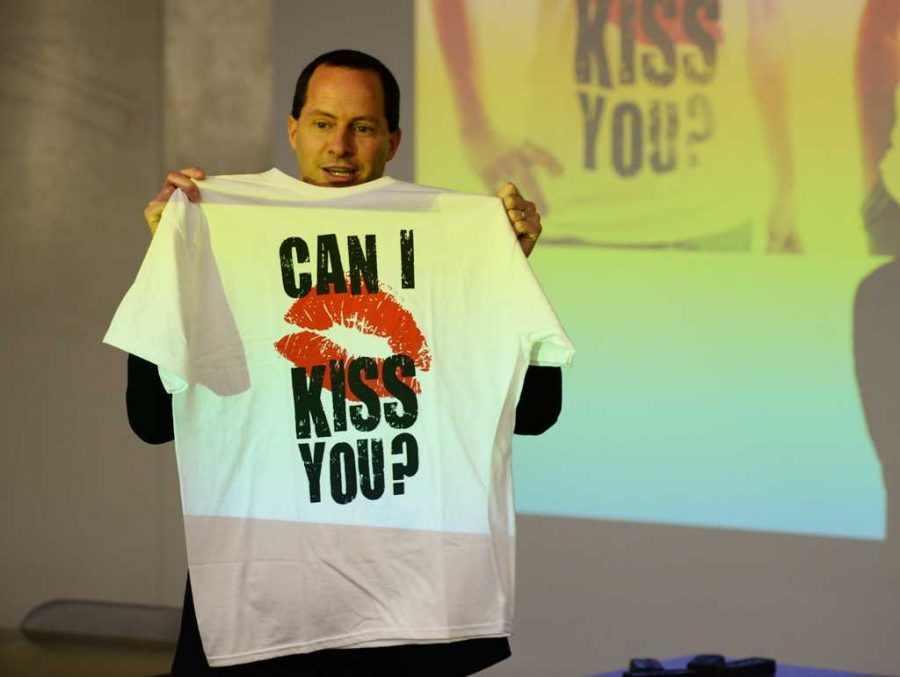College students are drilled on the definition of consent over and over — but many of them don’t understand how to apply these lessons to their daily lives.
On Monday, Mike Domitrz, founder of The Date Safe Project — an organization that dedicates itself to educating people about consent as well as supporting survivors of sexual victimization — instructed about 30 students in Benedum Hall on how to recognize consent and obtain it in everyday life.
The Office of Affirmative Action, Diversity and Inclusion sponsored the talk, which Domitrz sprinkled with questions and anecdotes from his personal experience as a proponent of consent.
For example, Domitrz challenged the trope of kissing a person after a first date without asking.
“Why don’t we just say, ‘May I kiss you,’ instead of going for it?” Domitrz asked.
“Fear of rejection,” a member of the crowd called out.
“Right. So don’t give them a choice, it just messes everything up,” Domitrz responded, lampooning the mindset of someone who doesn’t ask for consent first. “Does that sound horrible, by the way, what I just said?”
Domitrz’s talk comes about a week after Pitt police reported four sexual assaults during a two-week period in Oakland.
For its part, Pitt has increased its focus on addressing sexual violence on campus since the beginning of the school year. In September, Pitt released the results of the 2015 Campus Climate Survey on Sexual Assault and Sexual Misconduct.
The survey showed female, transgender and gender-nonconforming students were more likely to experience harassment or sexual assault on campus. While many respondents were aware of resources on campus like the Wellness and Counseling Centers, many didn’t know what would happen after they reported an assault.
Domitrz, who has been educating people about consent for 25 years, said he started acting as an advocate and activist for victims of sexual assault when he found out about his sister’s rape 27 years ago.
When his mother had called him and told him, he said only one thought was going through his head — he wanted revenge.
But then, Domitrz said, he realized he didn’t have the right to feel this way if he wasn’t helping all the other victims of sexual assault. He called on his audience to stop “saying, ‘Rape is awful — but I’m not going to do anything about it.’”
Katie Pope, Pitt’s Title IX coordinator, said too many students think about consent in the abstract, and she wanted to bring Domitrz to Pitt to help make the concept more concrete.
“A lot of folks don’t understand consent — we brought [Domitrz] here to change that,” Pope said at the event.
Pitt senior, audience member and former president of the Campus Women’s Organization, Eleanora Kaloyeropoulou, said education about consent is the most important part of combating sexual assault.
“This is an issue that affects more people than the victims,” Kaloyeropoulou, a history major, said. “These people are our friends. These people are our classmates.”
Jasmine Butler, junior and chair of Student Government Board’s wellness committee, said sexual assault is a real problem at Pitt, and Domitrz’s talk changed the way she’ll act as a bystander.
“So many times you look out at a stranger and think, ‘That’s not my business.’ But they’re human too,” Butler said. “Everyone on this campus has either been directly affected by sexual assault or knows someone who has been.”
Domitrz said the widespread problem has shed light on which schools are truly dedicated to fighting sexual assault.
“Pitt’s doing it,” he said, by sponsoring consent programs and hosting speakers like him. “A lot of schools aren’t even having the conversation.”
He said learning the positive sides of intimacy go hand in hand with learning about sexual assault — asking for consent is a sign of respect, but it’s also a necessity for everyone.
Throughout his lecture, Domitrz repeatedly emphasized the right of everyone to decide what happens to their own body.
“Even if I disagree with everything they do,” Domitrz said, “each person still deserves dignity and respect.”



